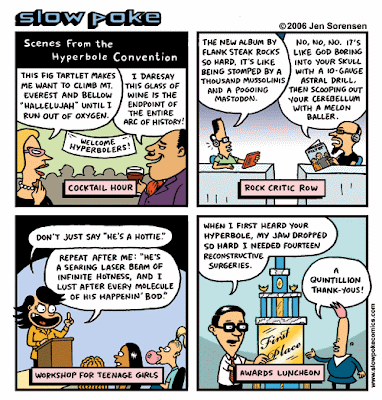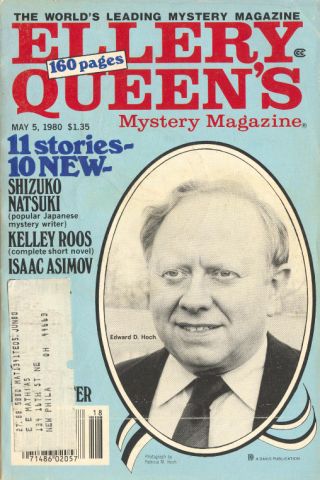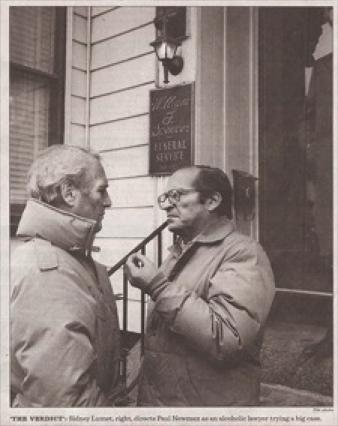Monday, April 25: Spirit of the Law
AMAZING! BRILLIANT! ABSOLUTELY PERFECT!
by Janice Law
Short mystery fiction may represent the absolutely last frontier of hype, a lonely headland free from multiple adjectives and dangling participles. Consider novels which in the bad old days were considered good, bad or indifferent, pleasant or stimulating or boring things to read. Now no novel worth an ad is anything less than an experience: shattering, heart breaking, gripping, miraculous. One hesitates to venture beyond the covers.
Well, you say, that’s advertising. So I thought. But a recent switch during my back exercises from CNN, which used to cover news and now covers celebrity, has opened up a new world and informed me that hype has escaped all rational bounds. I refer to the food and home shows.
I always thought of cooking as a functional activity, hard work certainly during canning season when my mother, like other rural women, “put up” a dazzling variety of veggies and fruits during the hottest months of the year. The food was good – she was an excellent cook – but among our friends the highest accolade was that some Scottish treat tasted “just like what you get at home,” home being, of course, the Auld Country. A clean plate said the rest.
Julia Child, one of the originators of the cooking show format, was scarcely more fulsome. She used good ingredients, explained everything clearly, and ended with “bon appetit!” What else was needed?
It turns out, quite a lot. Someone whips up some cream. “It’s amazing!” I doubt that very much. Potatoes get mashed with a bit of garlic and rather more butter than is good for the arteries: “Perfect!” I sense a lower standard than usual. Crabmeat is stirred with an avocado: “This is unbelievable!” Clearly, a person of wild credulity.
And my favorite, usually produced by deserts: “You haven’t lived until you’ve tasted this!” The accolades of current novels begin to look, if anything, on the modest side.
Home shows have opened my eyes still further. The chefs, usually laboring alone in their studio kitchens, have to provide their own blurbs, rather as if writers had to produce a story and then rave about it themselves. The home shows have the invaluable Homeowner, who not only foots the bills but celebrates the results, often nonverbally.
Jumping up and down in excitement is good. This makes the designer du jour feel appreciated. Tears of joy are better, and failing those, hugs for the designer and cries of “Oh, my God” are de rigueur.
Who knew that the secret of happiness lay in granite counters, an expensive and unforgiving product, formerly associated with the gray architecture of Aberdeen and with curling stones? But, yes, their presence almost guarantees cries of ecstasy, while their absence leads to airs and complaints any duchess would admire.
Glass tiles, another tricky installation, are also a bringer of delight. Add in some recessed lighting and some stainless steel and we’ve entered the realm of the mega-adjectives: All Amazing! Brilliant! Absolutely Fabulous!
One can hardly remember that we are talking about a kitchen, here, a functional space where on good days all the appliances work, the clutter is under control, and the health inspector is nowhere in sight.
Thinking it over, how much more deserving of a few plaudits are those who make something out of nothing, spinning yarns for fun and, maybe, profit? I just finished reading the May Alfred Hitchcock, where Robert Lopresti has a story and yours truly does, as well. All the stories are given modest, informative introductions, and the editor assures us they made her chuckle and thinks the reader will enjoy them as well.
It’s low key and I like it, but my Sundays with the New York Times Book Review, my trawl along our library’s new books’ shelf, and afternoons with the home and food channels tell me that the whole genre is seriously behind the times. Short fiction needs to get with the program, and there are plenty of models to steal from. A little story about “a socially inept genius”? “Dazzling and insightful. Heartbreaking!”
A carnival story about the theft of ancient bones? How about “extravagantly witty and smart?” Murder at a therapy group? Maybe not “High Voltage Shocks” but certainly we could go with “A literary miracle.” A law officer troubled by motivation? “Unassuming brilliance” fits the bill, while considering the importance of the telephone in another story, “Sizzling” seems apt.
If we were cook show hosts, we could add these bite sized encomiums as we wrote. Lest anyone miss my clever opening, I could add, “This is brilliant”, perhaps in italics. A good bit of action could carry the tag line “paced faster than a speeding bullet” and some nice dialogue could be dubbed, like that in one recent novel, “strong as steel.”
Now as writers, we would naturally worry about repetition. No worries. It’s repetition that does the job. Keep telling folk the stuff is brilliant, whether it’s countertops, pasta, or plot, and if this catches on, short mystery fiction will have joined the 21st century.


























